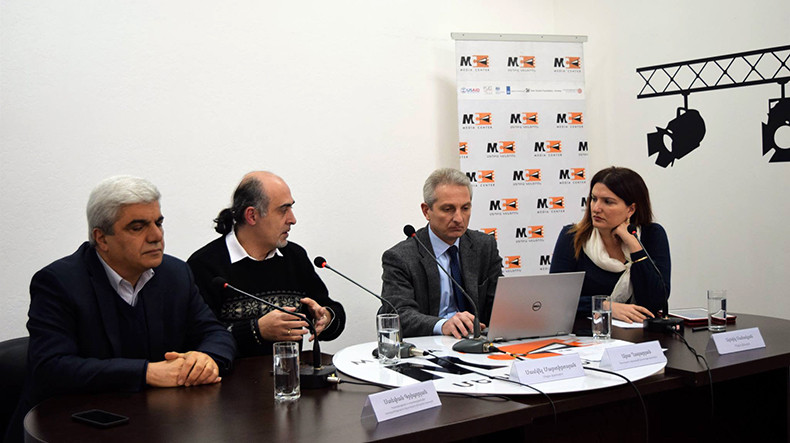
Samvel Martirosyan insists Lapshin case could have far-reaching consequences
Expert in International Law Ara Ghazaryan doubts the lawfulness of Azerbaijani extradition request for Alexander Lapshin, arguing extradition procedures are normally regulated by bilateral treaties and the Convention with the Minsk Convention to be the case in the current situation. Speaking at a discussion over the situation around Russian blogger and traveler, who faces extradition to Azerbaijan over his visits to the Nagorno-Karabakh Republic (NKR), Ghazaryan says the justification for the extradition of the requesting state should at least “correspond to reality.”
Ghazaryan recalled the Safarov case when the Hungarian side had received assurances from the Azerbaijan government that the murderer would serve the remainder of the sentence in the motherland, yet upon returning to Baku, Safarov was pardoned, freed, even named as a hero.
“The justification about combating crime is artificial with Lapshin having been accused for illegally crossing the border. Given the fact that Lapshin is a journalist, he is accused of having favorable position toward the Armenians and for critisizing the Azerbaijani leadership. We deal with both the violation of freedom of speech and the guarantee for eliminating the discrimination,” Ghazaryan noted.
He informed that Chairman of the Chamber of Advocates of Armenia Ara Zohrabyan maintains contacts with Lapshin’s family members. The Belarusian Prosecutor’s Office decision of Lapshin’s extradition to Azerbaijan has not been appealed yet. Armenian lawyers are working to help Lapshin. They have already sent a document with legal conclusions to the Belarusian authorities, where parallels between Article 281 of the Azerbaijani Criminal Code and the notorious 301 Article of the Turkish Panel Code [Turkey’s Article 301 the Penal Code makes it illegal to insult Turkey, the Turkish nation, or Turkish government institutions].
“Dink, Pamuk and dozens of criminal cases prosecuted under that Article [301] are largely criticized by international community and the ECHR. When a person makes a public statement criticizing a policy of a certain state, it should not and cannot be qualified as appeals against territorial integrity and constitutional order of that state,” Ghazaryan reasoned.
Media expert Samvel Martirosyan, present at the discussion, referred to uncollaborated reports about new charges brought against the blogger, particularly accusations of organizing a terrorist group in Azerbaijan, which is a common charge practiced by Azerbaijani law enforcement against the local bloggers and activists.
“To me, Azerbaijani and Belarusian authorities are attempting to make the case look more serious to avoid criticism. The case is gradually drawing more attention and noise. The case is obviously of political nature, yet the future course of the developments remains unpredictable,” Martirosyan said, admitting the situation may far-reaching consequences.
“Where is the guarantee that any political scientist, journalist, disliked by the Azerbaijani leadership is not arrested in Minsk and handed over to Azerbaijan. He may not necessirrily be a citizen of Armenia. Many people are perceived as threats by the Azerbaijani government in terms of propaganda and information. Do we have guarantees that one day they are not be arrested at the request of Azerbaijan,” the media expert wondered, adding people should consider the dangers while planning a visit to Belarus.
Samvel Martirosyan also explained the Azerbaijani policy as trying to curb the growing number of people visit Artsakh.
Newsfeed
Videos






























